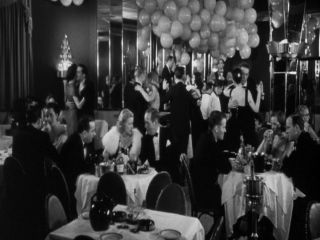The MacGuffin: News and Comment (19/Jul/2008)
(c) Ken Mogg (2008)
July 19
Paradoxical as this sounds, one of Hitchcock's most 'ghostly' films is undoubtedly The Wrong Man (1957), based on a true case. It prefigures both Vertigo (1958) and the titles-sequence of North by Northwest (1959). The latter, which I've analysed here before (and in 'The Alfred Hitchcock Story'), is likely indebted to a famous passage in T.S. Eliot's 'The Waste Land' (1922) as well as to the start of Hitchcock's own Rich and Strange (1932). The Eliot passage includes the lines, 'A crowd flowed over London Bridge, so many,/ I had not thought death had undone so many' - and itself takes inspiration from both Dante's 'Inferno' and some lines from Baudelaire about 'a swarming city ... full of ghosts'. So let's talk about The Wrong Man as a ghost story and about a related matter, Hitchcock's attitude to the bourgeois class. (Cf above, June 28 and July 5.) In the pre-credits and credits sequence of The Wrong Man, Hitchcock manipulates both the film's soundtrack and its editing to 'transcend' respectively space and time. (I have analysed these sequences in an article, "The Man Who Knew Too Little", originally published in 'The MacGuffin' #6, February 1992.) In particular, he brilliantly employs a succession of dissolves to show patrons at the Stork Club, where 'Manny' Balestrero (Henry Fonda) plays the double-bass, being seemingly 'spirited away' during the course of the evening. (See frame-capture below: the table in the foreground was earlier occupied.) Thus the sequence prepares us for the strange sensation that Manny himself will feel later, when accused of armed robbery, and of which he is palpably innocent. That sensation is one of loss-of-control, powerlessness, even of being a ghost passing unnoticed among the living - though the latter may themselves be ghosts. (A precedent for this sort of passage is to be found in novels by Charles Dickens, notably 'Our Mutual Friend' [1865].) During the sequence when detectives in a patrol car take Manny around the city to visit the hold-up sites, such as a liquor store, people caught in the car's headlights look like wraiths. Also, Manny and the audience are continually being given hope that his case will resolve itself successfully but then having those hopes dashed. For example, there's a moment when Manny strides purposefully across the snow at the up-state resort where he and his wife Rose (Vera Miles) had spent their summer vacation on one of the hold-up dates - but the resort's proprietors are unable to give him the alibi he had hoped for. Sooner or later, you feel, Manny may break down. In fact, it's Rose who does so. Practically all of this - I have shown in 'The MacGuffin' - has its precedents in another Dickens novel, one which Donald Spoto notes deeply impressed itself on Hitchcock's mind, and that is 'Bleak House' (1853), itself full of 'ghostly' effects. But here's my point. A contemporary of Dickens, the so-called 'father of existentialism', was the Dane Sören Kierkegaard (1813-55), who wrote: 'The bourgeois mind is really the inability to rise above the absolute reality of time and space, and as such is therefore able to devote itself to the highest objects, e.g., prayer, [only] at certain times and with certain words.' Though I haven't space and time (!) to further illustrate it here, what I think Hitchcock does in The Wrong Man is use the medium of film to both critique Manny ('the man who knew too little') and to valorise him for his faith. This time I'm reminded of another famous critic of the bourgeoisie, author Gustave Flaubert (1821-80), whose character Emma Bovary was Hitchcock's favourite character in fiction. One day, as Flaubert was walking out with his sister, they saw outside a small house behind a white picket fence the very epitome of a bourgeois family: a father playing with his typically-middle-class children while their mother looked lovingly on. Spontaneously, Flaubert exclaimed, 'Ils sont dans le vrai!' ('They are in the truth!') Mutatis mutandis, The Wrong Man is as ambivalent as Flaubert about its bourgeois family, the Balestreros.
This material is copyright of Ken Mogg and the Hitchcock Scholars/'MacGuffin' website (home page) and is archived with the permission of the copyright holder. |

